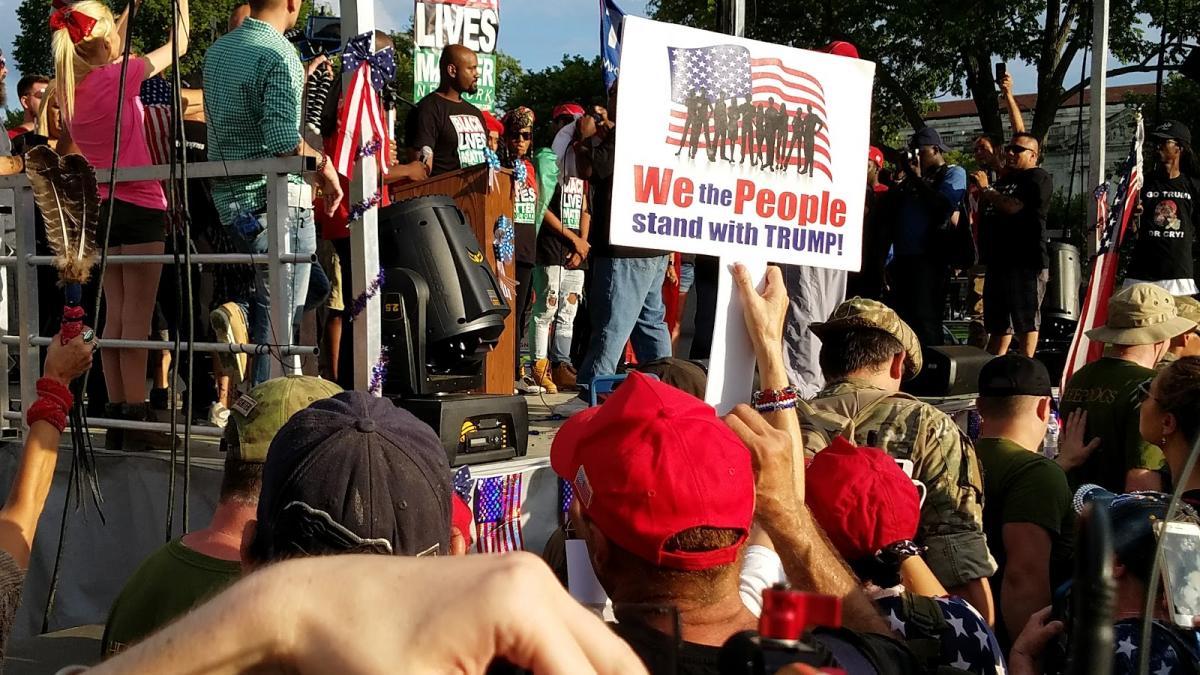By: William Howell
In an early-August radio interview, white supremacist Jason Kessler rejected the labels of “white supremacist” and “white nationalist,” instead calling himself a “civil and human rights advocate focusing on the under-represented Caucasian demographic.” Alongside racist assertions about the intelligence of different ethnic groups, Kessler managed to stress that “there's really no place that it's OK for me to speak” about “what interests are important to [white people] as a people.” [1] And, to some limited degree, he has a point.
 Kessler’s proposition is bonkers—but rather than call it “bonkers,” consider what it says about twenty-first century identity, discourse, and American government. (Spoiler: we’ve got to embrace uncomfortable conversations to steady the ship of state.)
Kessler’s proposition is bonkers—but rather than call it “bonkers,” consider what it says about twenty-first century identity, discourse, and American government. (Spoiler: we’ve got to embrace uncomfortable conversations to steady the ship of state.)
In the course of business, governments “convoke, provoke, and evoke collective and individual identities,” and truly democratic governments, argues political theorist Anne Norton, collaborate with citizens to create those identities. [2] This is particularly true in the United States, where people converged into a single polity from all over the world, and where political rights have always been tied to identities. Those identities are created through active discourse, proposes Stuart Hall, and remain “points of temporary attachment.” [3] But are “temporary attachment[s[” a solid foundation for a system of government—especially one so steeped in identity-based rights? Surely not.
In his book, Angry White Men, sociologist Michael Kimmel offers a distinction about human expression which applies usefully to Kessler and his ilk. Kessler’s comments are “real” and demand attention in that they reflect his “[experience] deeply and sincerely.” We can acknowledge this without acknowledging Kessler’s experience as “true” because it “doesn’t provide an accurate analysis of [the] situation.” [4]
Casting Kessler’s untrue comments as real, then, recasts the white supremacist himself as someone struggling with his identity in American politics. Kessler is a (white male) canary in the coal mine, reflecting a government struggling with a rhetorical duty to its citizens, and citizens struggling with a duty to each other. That duty, suggests Gloria Anzaldúa, is to help citizens “shift positions, change positions, [and] reposition ourselves regarding our individual and collective identities.” [5]
 And there’s other canaries. Following the defeat of the first major-party female presidential nominee, historian Mark Lilla penned an op-ed (and later, book) about “The End of Identity Liberalism.” He noted “the omnipresent rhetoric of identity” in contemporary American politics and proposed that, as “in healthy periods,” political discourse must refocus on “appealing to Americans as Americans” rather than belaboring other identities. [6] Two months later, millions of people voiced their skepticism through a protest grounded in gender identity—the largest in US history, it turns out. [7] In the current election cycle, we’ve seen a record-breaking number of female candidates. [8] One of those women, Georgia’s Stacey Abrams, became the first black woman in the US to be a major party's nominee for governor; and if she’s elected, and if Florida’s Andrew Gillum and Maryland’s Ben Jealous win their elections, the US will almost double the number of black governors in its history. [9] And as the Supreme Court heard cases about immigration, marriage equality and gender, the Education and Justice Departments grabbed national headlines fighting transgender student rights and affirmative action. [10]
And there’s other canaries. Following the defeat of the first major-party female presidential nominee, historian Mark Lilla penned an op-ed (and later, book) about “The End of Identity Liberalism.” He noted “the omnipresent rhetoric of identity” in contemporary American politics and proposed that, as “in healthy periods,” political discourse must refocus on “appealing to Americans as Americans” rather than belaboring other identities. [6] Two months later, millions of people voiced their skepticism through a protest grounded in gender identity—the largest in US history, it turns out. [7] In the current election cycle, we’ve seen a record-breaking number of female candidates. [8] One of those women, Georgia’s Stacey Abrams, became the first black woman in the US to be a major party's nominee for governor; and if she’s elected, and if Florida’s Andrew Gillum and Maryland’s Ben Jealous win their elections, the US will almost double the number of black governors in its history. [9] And as the Supreme Court heard cases about immigration, marriage equality and gender, the Education and Justice Departments grabbed national headlines fighting transgender student rights and affirmative action. [10]
All these political examples don’t even include the numerous popular cultural identity discourses such as #OscarsSoWhite, or black athletes and celebrities highlighting their racial identities with Black Lives Matter protests. [11]
In each of these examples, as with Kessler, Americans are struggling with the meaning(s) of an identity they hold near and dear. As Americans reassess the symbolic meanings of various politically-charged identities—their own as well as others—their struggles burst on to the public stage in uncomfortable ways. We can shirk from the discomfort upon hearing Jason Kessler’s racist interview, or throw our arms up when Donald Trump dog-whistles, but we do so at our own peril.
America’s political stability requires stable—but not static—identities. It requires us, as citizens, to wade into these identity discourses, even when they seem gross, uncomfortable, or “bonkers.” It requires us to evaluate for truth, in Kimmel’s formulation, while respecting “real” experience. It requires these rhetorical behaviors just as surely as it requires us to vote, or submit testimony about legislation, or serve on juries.
By communicating in the public sphere, and ensuring spaces for discourse, the Jason Kesslers and Stacey Abrams and you and me work together, as equal citizens, toward new meanings for old identities that will stabilize our shared polity.
[1] “Jason Kessler On His ‘Unite The Right’ Rally Move To D.C.” Morning Edition. Washington, DC: National Public Radio, August 10, 2018.
[2] Norton, Anne. 95 Theses on Politics, Culture, and Method. New Haven, CT: Yale University Press, 2004. 55.
[3] Hall, Stuart. “Introduction: Who Needs Identity?” In Questions of Cultural Identity, edited by Paul Du Gay and Stuart Hall. London; Thousand Oaks, CA: Sage, 1996. 6.
[4] Kimmel, Michael S. Angry White Men: American Masculinity at the End of an Era. Kindle Edition. Nation Books, 2013. Location 374.
[5] Anzaldúa, Gloria. “Bridge, Drawbridge, Sandbar, or Island: Lesbians of Color Haciendo Alianzas.” In Social Perspectives in Lesbian and Gay Studies: A Reader, edited by Peter M. Nardi and Beth E. Schneider. Routledge, 2013. 529.
[6] Lilla, Mark. “The End of Identity Liberalism.” The New York Times, November 18, 2016.; also see Lilla, Mark. The Once and Future Liberal: After Identity Politics. New York: Harper, 2017.
[7] “Record Numbers of Women Running for Office May Not Mean Big Gains in Congress.” Bloomberg, May 7, 2018.
[8] Dockray, Heather. “The Largest Protests in American History Are Happening Now. Expect Them to Get Bigger.” Mashable (blog), March 27, 2018.
[9] Siders, David. “Surge of Black Candidates Comes as Trump Stokes Racial Tensions.” POLITICO, August 29, 2018.
[10] Hawke, Catherine. “Previewing the October 2017 Supreme Court Term.” American Bar Association: Insights on Law and Society, 2018.; Savage, Charlie. “In Shift, Justice Dept. Says Law Doesn’t Bar Transgender Discrimination.” The New York Times, January 20, 2018.; Green, Erica L., Matt Apuzzo, and Katie Benner. “Trump Officials Reverse Obama’s Policy on Affirmative Action in Schools.” The New York Times, August 7, 2018.
[11] Lopez, Ricardo. “Academy Skirts Another #OscarsSoWhite Disaster With a Diverse Lineup, But Who Will Win?” Variety (blog), January 23, 2018.; Howell, William, and Trevor Parry-Giles. “From Tweets to Movements: Celebrity Power and the Modern Police State.” Celebrity Studies 6, no. 4 (October 2015): 610–12. https://doi.org/10.1080/19392397.2015.1092216.
About the Author:
 William Howell graduated from Macalester College in 2008 and earned his Masters from the University of Maryland in 2016. Since 2008, he has spearheaded outreach and engagement for political campaigns and advocacy efforts in Minnesota and Oregon. He is currently pursuing a Ph.D. in Communication, studying how entertainment sources impact US citizens' political participation, political identity, and perceptions of political issues and actors.
William Howell graduated from Macalester College in 2008 and earned his Masters from the University of Maryland in 2016. Since 2008, he has spearheaded outreach and engagement for political campaigns and advocacy efforts in Minnesota and Oregon. He is currently pursuing a Ph.D. in Communication, studying how entertainment sources impact US citizens' political participation, political identity, and perceptions of political issues and actors.
